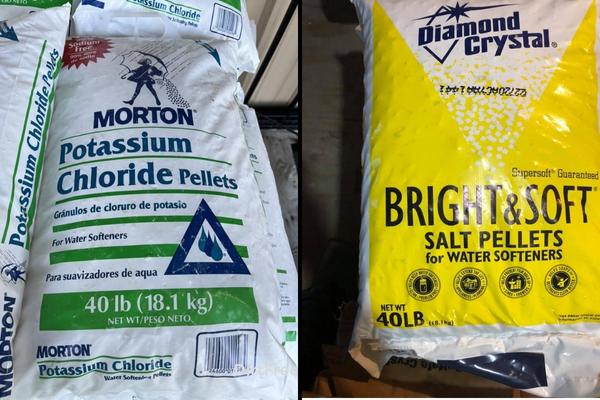Potassium vs. Sodium Water Softener (Be Care full while Choosing)
Do you wish to shift to water softeners but do not know which one is better?
Some people claim potassium softeners are better than sodium softeners, while others hold the opposite view.
But which one should you believe?
Wait, why should you believe someone else’s opinion?
Read this article to understand it yourself which is better for your use. We have compared them with different aspects.
Let’s see which one you should choose: Potassium vs. Sodium water softener.
Which is better for Water Softener: Potassium or Sodium
It all comes down to this question: which is the better one; is it potassium or is it sodium?
Well, I have discussed all the aspects which will let you come up with that decision for yourself.
Remember that these water softeners function similarly, the key difference being what is left behind in the refrigerated water after performing their duty.
Health benefits
Now, if you have a diet by which your sodium level needs to stay low, you have to choose a potassium water softener for the obvious reason. It will not affect the sodium intake level at all.
Keep in mind – When using a sodium water softener, a tiny amount of sodium gets added to your tap water, which has no health effects for most people.
It is known that potassium is a nutrient that is very beneficial for your overall health.
But, if you suffer from kidney stones or some other renal issues, do not opt for a potassium water softener as potassium will only provoke your already existing conditions, ending up being harmful to you rather than helpful.
Cost
Regarding cost, sodium water softeners are not only cheaper than potassium water softeners but also three times more cost-effective.
The potassium solution costs more than the sodium solution, and potassium gets heavily consumed as well.
To give you a clearer picture, potassium chloride will take up to three times of potassium compared to sodium chloride, and that too per bag of sodium chloride.
Sodium water softeners prove themselves to be a more pocket-friendly option.
Eco-Friendliness
Potassium water softeners are better than sodium water softeners for the environment as potassium chloride is a great contributor to plant strength as well as to the stability of the soil.
The disposal of potassium is later absorbed by plants which lead to their growth; on the other hand, sodium chlorides prove to be of no practical use.
Is Potassium better for Water Softening?
Not only is potassium completely safe to consume, but consumers who have shifted from sodium water softeners to potassium water softeners have also witnessed a lot of benefits.
Several reasons explain why potassium can be better for water softening are –
- Our body requires an intake of potassium but can’t produce potassium on its own. That is why even if in small quantities, potassium enters our body through these potassium water softeners, it helps and healthily maintains our body.
- Potassium water softeners are the go-to choice if you are suffering from any heart disease and must be on a low-sodium diet. Choosing potassium water softeners will keep those diseases at bay, not letting them get any worse than they already are.
- Not only for humans but potassium also benefits the environment greatly. It leaves a low to no carbon footprint when compared to sodium and even plants see excellent growth when they enjoy the water that’s rich in potassium.
Can I switch Water Softener from Sodium to Potassium?
Yes! Even if you have been using sodium chloride salts, you can easily switch your water softener to potassium next time. The only thing you need to be in check with absolutely is the duration of the recharge of the softener.
As potassium and sodium are salts, potassium works as a perfect substitute for sodium chloride.
Why are Potassium Water Softeners so Expensive?
The major downside to using potassium in your water softeners is that it is much more costly than sodium.
The reasons for the same are –
- Extracting potassium chloride from Earth is costlier than mining sodium chloride.
- More quantity of potassium is required to soften the water. This causes the operating cost of your water softener to go up.
Cost of using Potassium Chloride in Water Softener?
Generally, the cost of both sodium chloride and potassium chloride bag(s) ranges between $5 to $25+ depending on what brand, what size, what purity rate and what location you are purchasing it in.
A 40 lb bag of potassium chloride costs around $65-85 or more.
Side Effects of using Potassium Chloride Water Softeners
Intake of too much potassium has serious risks and side effects that are concerning. Some of the side effects of consuming excessive potassium include diarrhea and vomiting.
Also, only consume potassium if you are aware of your health conditions. (if any)
FAQs
Is it safe to drink Water Softened with Potassium Chloride?
Yes, potassium chloride is safe to drink and has its benefits.
It’s the best alternative for people who have low-sodium diets.
Before you start drinking potassium water, you just keep in mind your health conditions and diseases (if any).
Can you mix Salt and Potassium in Water Softener?
Yes, you can mix salt and potassium in your water softener.
As both of them are salts that perform the same function of softening your water, they can be used interchangeably and by mixing both of them together.
Is using Potassium Chloride as a Water Softener good for Plants?
It is safe; rather, it is very beneficial to use potassium-rich water for your plants as it will boost their growth.
Potassium is a natural fertilizer for plants, and you can see some amazing results when you use potassium to water your plants.

